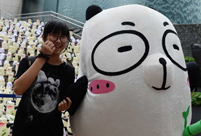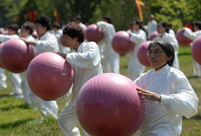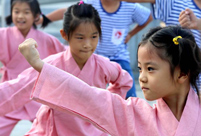 Amphibious armored vehicle unit conducts open sea drill
Amphibious armored vehicle unit conducts open sea drill
 Water relay in Henan
Water relay in Henan
 Ethnic culture feasts eyes of travelers
Ethnic culture feasts eyes of travelers
 80 security dogs assembled in Nanjing police dog training base
80 security dogs assembled in Nanjing police dog training base
 Graffiti artists paint on street walls in Xinjiang
Graffiti artists paint on street walls in Xinjiang
 Story of ceramic artist Zhang Lingyun
Story of ceramic artist Zhang Lingyun
 Magic summer night dream in Hongyuan
Magic summer night dream in Hongyuan
 Incredible creatures in headwaters drainage region of Lancang River
Incredible creatures in headwaters drainage region of Lancang River
 The future of rock n' roll seen in young rockers in China
The future of rock n' roll seen in young rockers in China
 Magnificent Yanziya Cliff
Magnificent Yanziya Cliff
BEIJING, Aug. 14 -- When thinking of Buddhists monks, words like traditional, secluded, ascetic and celibate spring to mind, but one Beijing temple is trying to overturn this cliche.
Longquan Monastery recently took to social networks to advertise an "IT Dhyana Camp" for employees of the capital's Internet companies. Indeed many Chinese temples invite in secular folks from all walks of life to try out the Buddhist lifestyle, but few adopt Longquan's niche marketing approach.
The three-day camp will first deprive all participants of their digital gadgets. It will include meditation training, Buddhism classes and farm work. The monastery charges no fees but everyone must follow temple rules including a vegetarian diet and simple lodging.
One theme of the camp is serving the greater good in developing technology. So far, more than 400 people have applied, according to Master Xianxin. The original plan was to recruit 150.
"Troubled IT workers who attend temple told us that despite advances in their careers and rapid company expansions, they suffer great anxiety and pressure. Some have lost their life goals and are confused about the future," he said.
"These are troubles facing many people. Unlike our Confucian ancestors who prioritized spiritual development, we now live in an era characterized by technological breakthroughs. Science and technology stress observation of the outside world, and many people today lack self-awareness."
SOUL SEARCHING
Despite a certain limited degree of technophobia, the monastery sees the positive side of technological advances. It has opened a blog and microblog to reach out to the secular world and even runs a studio that produces Buddhist animations.
"Our abbot believes that Buddhism is an ancient religion, but Buddhists are modern people," Xianxin said. "We don't see an inevitable clash between Buddhism and technology. Instead, new technology can assist with the spread of Buddhism."
China has only about 100 million religious people in a population of 1.37 billion. Though Buddhists remain a small demographic minority, attendance at temples is increasing and there is growing enthusiasm for the Buddhist faith.
Last year, a temple in Zhejiang Province made a splash online with its "temporary monkhood" program and was swamped with applicants, including students and entrepreneurs seeking respite from their stressful lives, with a hint of religious wisdom.
Buddhist masters have huge followings online, sharing wisdom and offering psychological guidance to netizens in quandaries.
"It's true that Buddhism and other religions are more popular than in the past, partially as a result of improving living standards in China," said Jiang Hong, researcher with Guangdong Institute of Ethnic and Religious Study.
Xianxin agrees. "Chinese society has reached a stage where many people no longer lack basic necessities and want to pay more attention to their spiritual needs," he said.
 Beijing policewomen posters become a hit
Beijing policewomen posters become a hit Armored regiment trains on the sea
Armored regiment trains on the sea Children spend 'Father's Day' with dads at work
Children spend 'Father's Day' with dads at work 'Pan Da' appear in Shanghai World Financial Center
'Pan Da' appear in Shanghai World Financial Center Champions take selfies on podium
Champions take selfies on podium National Fitness Day celebrated around China
National Fitness Day celebrated around China Traditional culture colors summer vacation
Traditional culture colors summer vacation Young athletes fighting for their dreams
Young athletes fighting for their dreams 68 meters high thermometer in Shanxi, called ‘fighter’ of thermometers
68 meters high thermometer in Shanxi, called ‘fighter’ of thermometers The vanishing folk skills
The vanishing folk skills Intoxicating beauty of Dali, Yunnan province
Intoxicating beauty of Dali, Yunnan province Memorable moments of Ludian earthquake
Memorable moments of Ludian earthquake Bring world together to help elephant
Bring world together to help elephant 'Building Dreams'
'Building Dreams'  Labrang Monastery
Labrang MonasteryDay|Week|Month